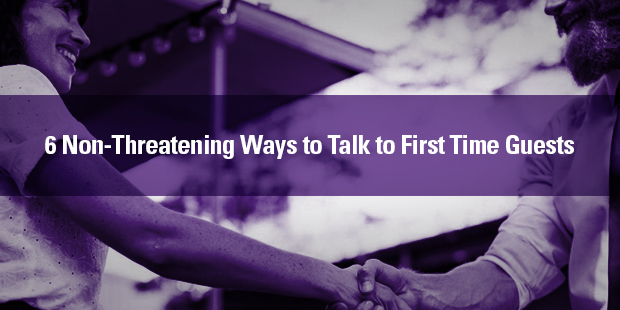
6 Non-Threatening Ways to Talk to First Time Guests
Q:
When I spot a guest in the lobby that I don’t recognize, how can I approach them without coming right out and asking “Is this your first time?
A:
Hats off to you for recognizing that the “Is this your first time?” question can have a negative nuance associated with it. True, on the list of icebreaker question hills we should die on, this one is admittedly low on the list (“I don’t know who you are or who you think you are, but you’re sitting in my pew” is probably a much bigger deal.)
Here’s why I say it’s negative: I’ve found that “Is this your first time?” can put a first-time guest on the defensive. It’s a knee-jerk reaction to a question that makes them feel like an outsider and scramble to build a narrative that bridges the gap between you and them.
We should do all we can to absorb the awkwardness on behalf of our guests. That means we take the burden of weirdness off of their shoulders and place it onto ours. And that translates even into the small details of beginning a conversation.
So let’s say you’ve spotted that first-timer across the lobby (see six tips here for how to do just that). How do you kick off the convo? Here are a few of my favorite practices:
Walk slowly through the crowd. Making a beeline toward a first-time guest can make them feel like they’ve been put on the spot. It may be better to warm them up by letting them see you talking to lots of people, not just targeting them.
Start with generics, move to specifics. Eye contact, a smile, and a “good morning” always serves as a good kickoff. You don’t have to go in for the kill from the first moment.
“I’m not sure we’ve met.” This is my personal favorite line to use. You’re shouldering the responsibility for knowing them, acknowledging that you may have met before (which is great for forgetful folks like me), and giving them an opportunity to open up in conversation.
Assess their longevity. Now is the time to figure out how long they’ve been around, so that you can best help them. After initial small talk, you can ask, “How long have you been attending?” If they answer a few months or more, you have the opportunity to see how their connection process is going. If they say a few weeks or less or – even better! – this is my first day, you get to play the hero by being genuinely excited to meet them and suggest a simple next step.
Don’t assume their desire for proximity. Some guests may prefer to fly solo on their first visit. Others may really be looking for a friend. You can help with this by asking if they have someone to sit with, someone to go to lunch with, someone they’re meeting, etc.
Find a way to follow up. Remember their name and make a point to find them after the service just to check in. If appropriate, give them your contact info or swap for theirs. The first visit is a big deal, yes, but it’s often what happens just after the first visit (like a personal note) that will determine whether a guest comes back.
How do you start conversations on the weekend?
Want to know more about Guest Experiences at your church? Let’s talk! Connect with an Auxano Navigator here.

Tags: Church Guest Experience, Danny Franks, Guest Experiences, first time guest












